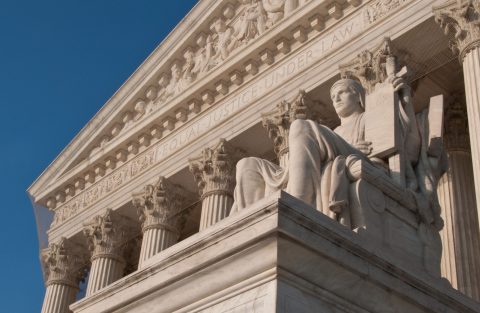Immigration Courts

A Lopsided Approach to Border Violence Doesn’t Solve Anything
During a debate of the defense authorization bill this week, Republican members of Congress are expected to push for the deployment of even more troops to the border. This is in addition to the 1,200 National Guard troops President Obama already requested to address border violence and the flow of drugs and guns across the border last month. However, while advocating for the allocation of more money and manpower to “secure the border” may make for good campaigning in an election year, experts find that beefing up the border actually does little to curb border violence. In fact, these “get tough” border initiatives—more troops, fencing and operations that target non-violent border crossers—pull valuable resources away from solving violent crimes. Read More

Class Action Challenging Arizona Law Reveals Depth of Constitutional Rights at Stake
Yesterday, a diverse group of individuals and organizations filed a class action challenging Arizona’s harsh immigration enforcement law SB 1070, scheduled to go into effect on July 28, 2010. This law, among other things requires state and local law enforcement to check the immigration status of individuals it encounters, and makes it a state crime to be without proper immigration documentation. The lawsuit offers a compelling look at the egregiousness of the law, the variety of constitutional rights at stake, and the diverse group of individuals and organizations who will be adversely affected if the law goes into effect. Read More

Immigrants, African Americans and the Struggle for Civil Rights
In a new report released today by the Immigration Policy Center, Before Brown, There was Mendez: The Lasting Impact of Mendez v. Westminster in the Struggle for Desegregation, author Maria Blanco examines the impact of a federal circuit court's 1947 decision which found the segregation of Mexican American school children in California unconstitutional. It is fitting that Blanco, who is the Executive Director of the Chief Justice Earl Warren Institute at Berkeley Law, wrote this paper because of the key role that Justice Warren played in both the Mendez and Brown cases. Before Brown, There was Mendez tells a unique story of an immigrant family as well as the story of the people who came together to support them and make history. The Mendez family story alone is an amazing tale of strength and perseverance in the face of discrimination and bigotry. Read More

New TRAC Reports Show a Staggering Immigration Caseload and an Unrelated Drop in Federal Prosecutions
The Transactional Records Clearinghouse (TRAC) reports that the backlog in U.S. Immigration Courts reached an all-time high of 228,421 cases in the first months of fiscal year (FY) 2010. However, the Executive Office for Immigration Review (EOIR) is taking important steps to alleviate this backlog by attempting to hire more immigration judges. The number of cases awaiting a hearing is up 23% from the end of FY 2008, and up 82% from 10 years ago. This has led to the average pending time for each individual case at the EOIR to rise to an all time high of 439 days. Read More

New ABA Study Documents Serious System-Wide Problems in the Removal Process
For over a year, the American Bar Association’s Commission on Immigration and the law firm of Arnold & Porter LLP engaged in a comprehensive review of the current removal process. The law firm poured over hundreds of articles, reports, legislative materials, and other documents, and interviewed scores of participants in the system, including lawyers, judges, advocacy groups, and academics. This study led them to conclude what many immigrants, their families, and immigration lawyers and advocates already knew and what many others suspected: the removal system is severely flawed and fails to afford fair process to all noncitizens facing deportation from the United States. The study details many of the deficiencies in the current system and makes a strong case for systemic reform. Read More

Supreme Court Protects Immigrants’ Access to Court Review
Yesterday, the U.S. Supreme Court issued a decision ensuring that immigrants facing deportation have fair process in the review of their cases. The Court ruled that individuals who seek to reopen their deportation orders have the right to appeal to the federal courts if the immigration court refuses to reopen the case. The Court's decision protects immigrants' access to federal court review and affirms the role of the courts in our system of checks and balances on government power. Read More

Supreme Court to Decide Whether Long Term Resident Can Be Deported Based on Possession of Anxiety Drug
Last week, the U.S. Supreme Court announced it would decide whether a permanent resident who was convicted of a second drug possession offense can be deported without an opportunity to make a case for why he should be allowed to remain in the United States. This case, which will resolve a split in the federal courts, will affect hundreds of immigrants who face deportation each year. It also serves as an unfortunate reminder that we still struggle with the adverse effects of the overbroad and unforgiving immigration laws passed by Congress in 1996. Read More

Shenandoah is a Cautionary Tale for How to Debate Immigration Reform
This week a police chief and two of his officers were charged with obstruction of justice in connection with their investigation of the beating death of Luis Ramirez, a 25-year-old undocumented Mexican immigrant, in Shenandoah, PA, last year. The two teenagers acquitted of his murder were also indicted on federal hate crime charges. While some measure of justice may eventually be served in the Ramirez case, this tragedy should serve as a cautionary tale as we move into 2010 and gear up for a new round of immigration reform debates. Policy makers and the media must understand that when the debate devolves from reasoned, fact-based discussions into fear and hate-mongering the consequences can be dire. Read More

ICE Transferring Detainees Impedes Their Access to Counsel and Limits Their Right to Present a Defense to Deportation
Two recent reports draw attention to yet another defect in the government’s problem-ridden detention system: ICE’s practice of regularly transferring immigration detainees from one jail to another, often far from where ICE initially arrested them. Transfers have a devastating effect on a person’s ability to retain counsel and maintain an attorney-client relationship; present a defense to deportation; and obtain release from detention. The government should take immediate steps to eliminate these effects and ensure that people who are detained are afforded a fair hearing. Read More

The Right to a Remedy for Ineffective Assistance of Counsel
Immigrants reasonably rely on their lawyers’ advice, and they expect their lawyers to be knowledgeable about immigration law and procedure. They count on their lawyers to be their voice in immigration court when facing removal and help ensure that they have a meaningful opportunity to be heard. In the great majority of cases, lawyers competently represent their clients’ interests. But what happens in those occasional situations where the immigrant is defrauded by an unscrupulous lawyer, or an otherwise competent lawyer makes an inadvertent mistake that results in the person being ordered removed from the United States? Certainly, a person should not be deprived of the opportunity to present a defense in removal proceedings because of his or her lawyer’s conduct. Read More
Make a contribution
Make a direct impact on the lives of immigrants.
